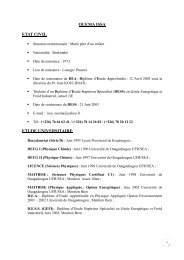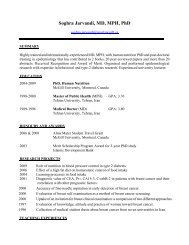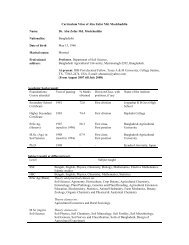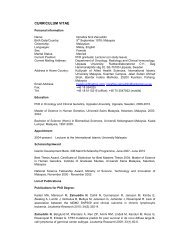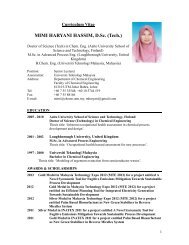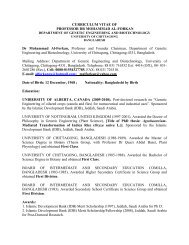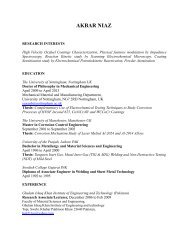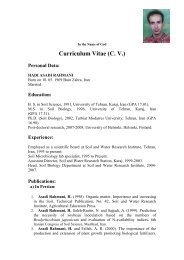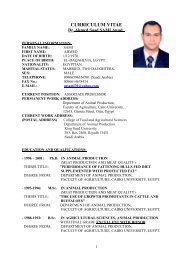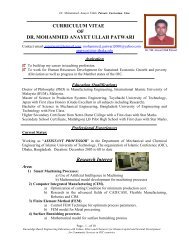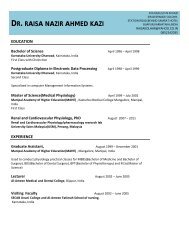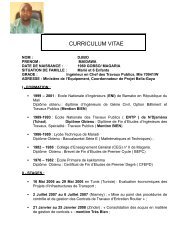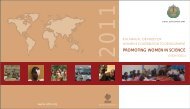Engineering: issues, challenges and opportunities for development ...
Engineering: issues, challenges and opportunities for development ...
Engineering: issues, challenges and opportunities for development ...
You also want an ePaper? Increase the reach of your titles
YUMPU automatically turns print PDFs into web optimized ePapers that Google loves.
The critical roles of engineering in addressing the large-scale pressing <strong>challenges</strong> facing our societies worldwide are widely recognized.Such large-scale <strong>challenges</strong> include access to af<strong>for</strong>dable health care; tackling the coupled <strong>issues</strong> of energy, transportation<strong>and</strong> climate change; providing more equitable access to in<strong>for</strong>mation <strong>for</strong> our populations; clean drinking water; natural <strong>and</strong>man-made disaster mitigation, environmental protection <strong>and</strong> natural resource management, among numerous others. As such,mobilizing the engineering community to become more effective in delivering real products <strong>and</strong> services of benefit to society,especially in the developing world, is a vitally important international responsibility.<strong>Engineering</strong> as a human endeavour is also facing numerous additional <strong>challenges</strong> of its own, including attracting <strong>and</strong> retainingbroader cross-sections of our youth, particularly women; strengthening the educational enterprise; <strong>for</strong>ging more effectiveinterdisciplinary alliances with the natural <strong>and</strong> social sciences <strong>and</strong> the arts; enhancing our focus on innovation, entrepreneurship<strong>and</strong> job creation, <strong>and</strong>; promoting increased public awareness <strong>and</strong> support <strong>for</strong> the engineering enterprise. This volume, the firstUNESCO Report on engineering, is an attempt to contribute to greater international underst<strong>and</strong>ing of the <strong>issues</strong>, <strong>challenges</strong> <strong>and</strong><strong>opportunities</strong> facing engineering, with a particular focus on contributions of our discipline to sustainable <strong>development</strong>.The Report, one of the most cost-effective reports UNESCO has published, is based almost entirely on voluntary contributionsfrom the international engineering community. I would like to begin by thanking the over hundred contributors. I would also liketo commend the coordinating <strong>and</strong> editorial team <strong>for</strong> their ef<strong>for</strong>ts – Tony Marjoram, Andrew Lamb, Francoise Lee, Cornelia Hauke<strong>and</strong> Christina Rafaela Garcia, supported by Maciej Nalecz, Director of UNESCO’s Basic <strong>and</strong> <strong>Engineering</strong> Sciences Division. I wouldalso like to offer my heartfelt appreciation to our partners – Tahani Youssef, Barry Grear <strong>and</strong> colleagues in the World Federationof <strong>Engineering</strong> Organisations, Peter Boswell, John Boyd <strong>and</strong> colleagues in the International Federation of Consulting Engineers,Bill Salmon, Gerard van Oortmerssen <strong>and</strong> colleagues in the International Council of Academies of <strong>Engineering</strong> <strong>and</strong> TechnologicalSciences. I also thank the members of the editorial advisory committee, <strong>and</strong> especially the co-chair, Kamel Ayadi, <strong>for</strong> their help ingetting the Report off the ground.This Report is a worthy partner to four UNESCO Science Reports, the first of which was published in 1998. Although engineeringis considered a component of “science” in the broad sense, engineering was not prominent in these reports. This opened thedoor to increasing calls from the international engineering community <strong>for</strong> an international study of engineering, <strong>and</strong> particularlyof the role of engineering in international <strong>development</strong>. This Report helps address the balance <strong>and</strong> need <strong>for</strong> such a study. As theDirector-General has noted, the future <strong>for</strong> engineering at UNESCO is also looking brighter following the proposal <strong>for</strong> an International<strong>Engineering</strong> Programme that was adopted at our recent Executive Board <strong>and</strong> General Conference in October 2009.PrefaceGretchen Kalonji, Assistant Director-General <strong>for</strong> Natural Sciences, UNESCOGiven its pervasiveness, engineering is indeed a deep <strong>and</strong> diverse topic, as this report illustrates. We have tried to cover thebreadth <strong>and</strong> depth of engineering as best we can, given the constraints we faced, <strong>and</strong> indeed Tony Marjoram <strong>and</strong> his team havedone a wonderful job in pulling it all together. We hope the Report will prove useful to a broad community, <strong>and</strong> are committedto continue to work together with our partners in the design of appropriate follow-up activities.5



